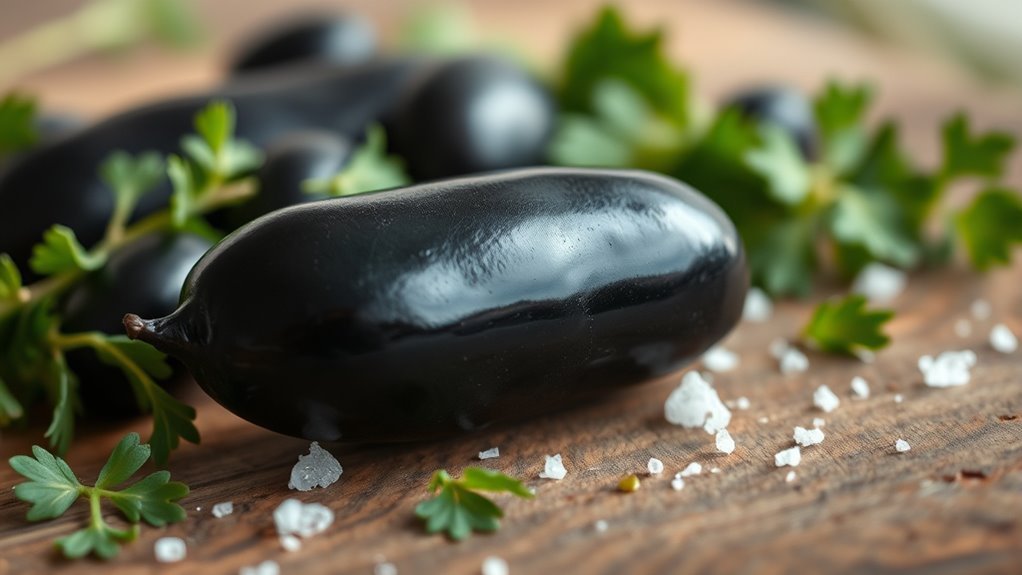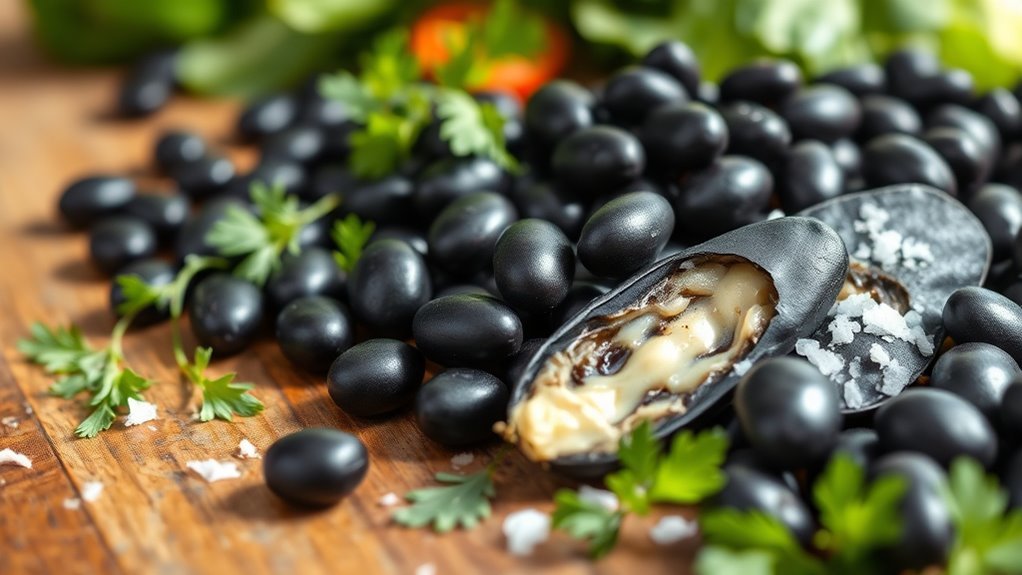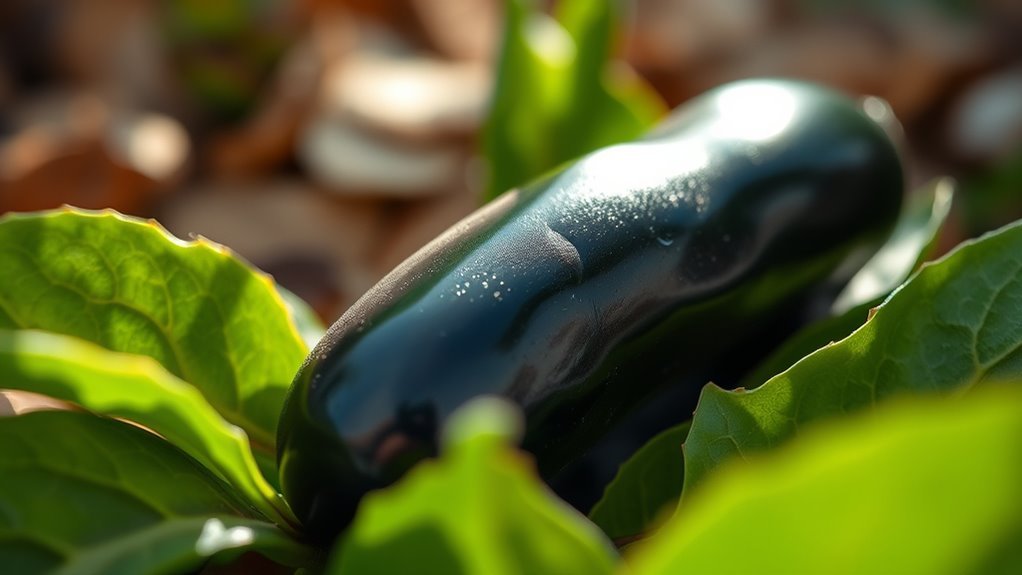Black beans aren’t usually considered keto-friendly due to their high carbohydrate content, containing about 40 grams per cup, which can disrupt ketosis. While they offer health benefits like fiber and antioxidants, the carb count is a concern for strict keto dieters. If you’re looking to incorporate them, keep your serving size small—around ¼ cup—and pair with low-carb veggies. There are also better low-carb alternatives available that can help you stay on track with your ketogenic goals. There’s plenty more to explore about managing carbs while enjoying nutritious foods.
Understanding the Ketogenic Diet

While many diets come and go, the ketogenic diet has gained significant attention for its potential benefits in weight loss and metabolic health. At its core, the ketogenic principles emphasize a high-fat, moderate-protein, and very low-carbohydrate approach. By drastically reducing carbs, your body shifts into a state of ketosis, where it burns fat for fuel instead of glucose. This macro balance allows for sustained energy levels and appetite control, offering you a sense of freedom from constant hunger. Research shows that the ketogenic diet can improve insulin sensitivity and promote fat loss. Understanding these principles can empower you to make informed choices about your nutrition, helping you achieve your health goals in a sustainable way.
Nutritional Profile of Black Beans

When considering black beans, it’s essential to examine their nutritional profile, particularly their carbohydrate content. You’ll find that they offer a good balance of protein and fiber, which can support digestive health and satiety. Additionally, black beans are rich in various vitamins and minerals, contributing to overall nutritional value.
Carbohydrate Content Overview
Although black beans are a popular choice for many diets due to their rich flavor and versatility, their carbohydrate content can be a concern for those following a ketogenic lifestyle. A ½-cup serving of cooked black beans contains about 20 grams of carbohydrates, which can greatly impact your daily carb limits on keto. While they provide essential nutrients and black bean benefits, such as antioxidants and vitamins, it’s vital to evaluate how they fit into your keto meal planning. If you’re keen on incorporating them, you might need to adjust portion sizes or balance them with lower-carb foods to maintain ketosis. Always assess how black beans align with your overall dietary goals before indulging.
Protein and Fiber Benefits
Black beans are not only a flavorful addition to meals but also a powerhouse of protein and fiber, making them a valuable component of many diets. With about 15 grams of protein per cup, they’re one of the best plant-based protein sources available. This protein content supports muscle growth and overall health. Additionally, black beans are rich in dietary fiber, offering around 15 grams per cup, which is essential for maintaining healthy digestion and regulating blood sugar levels. Increasing your fiber intake can also promote feelings of fullness, aiding in weight management. By incorporating black beans into your meals, you can enjoy these benefits while savoring a delicious and versatile ingredient that fits well into various dietary preferences.
Vitamins and Minerals Present
Packed with essential vitamins and minerals, black beans offer a rich nutritional profile that can greatly enhance your diet. Their vitamin content includes significant amounts of B vitamins, particularly folate, which plays a vital role in cell division and overall health. You’ll also find vitamin K, important for blood clotting and bone health.
On the mineral side, black beans provide magnesium, which supports muscle function and energy production, and iron, essential for oxygen transport in the blood. Additionally, they contain potassium, beneficial for heart health and maintaining fluid balance. By incorporating black beans into your meals, you’re not just adding flavor; you’re also reaping numerous vitamin and mineral benefits that support your overall well-being and freedom to thrive.
Carb Content in Black Beans

When considering the carb content in black beans, it’s essential to look at their nutritional profile. A standard serving of black beans contains about 40 grams of carbohydrates, which can be a concern for those following a strict keto diet. While they offer a good amount of protein and fiber, their carb count may not align with your keto goals. If you’re exploring black bean alternatives, you might find options like chickpeas or lentils more suitable. Here’s a quick look at the carb content in black beans compared to some keto-friendly legumes:
| Legume | Carbs per 100g |
|---|---|
| Black Beans | 40g |
| Chickpeas | 27g |
| Lentils | 20g |
Fiber vs. Net Carbs
When considering black beans on a keto diet, it’s essential to understand the relationship between fiber and net carbs. Fiber offers various health benefits, including improved digestion, and it doesn’t greatly impact blood sugar levels. By calculating net carbs—total carbs minus fiber—you can better assess how black beans fit into your dietary goals.
Understanding Fiber Benefits
Although you might be concerned about the carb content in black beans, understanding the role of fiber can considerably change how you view their impact on a ketogenic diet. Fiber types play a significant role in promoting digestive health and enhancing your overall well-being. Here are three key benefits of fiber:
- Satiety Effects: Fiber-rich foods like black beans can help you feel fuller for longer, supporting weight management.
- Digestive Health: Soluble and insoluble fibers work together to promote regular bowel movements and prevent constipation.
- Fiber Sources: Incorporating diverse fiber sources into your diet can improve your fiber intake, leading to a healthier gut microbiome.
Calculating Net Carbs
Calculating net carbs is essential for anyone following a ketogenic diet, as it helps determine how certain foods fit into your daily carbohydrate limit. To calculate net carbs, you subtract the grams of fiber from the total carbohydrates in a serving. This is important because fiber isn’t digested and doesn’t impact blood sugar levels. For example, if a food contains 20 grams of total carbs and 8 grams of fiber, the net carbs would be 12 grams. By focusing on net carbs, you can enjoy more freedom in your food choices while staying within your carb limits. Understanding this calculation empowers you to make informed decisions about what to include in your meals, ensuring you remain aligned with your keto goals.
Black Beans Nutritional Profile
Understanding the nutritional profile of black beans is essential for anyone evaluating their place in a ketogenic diet. While they offer health benefits, it’s vital to assess their carbohydrate content against dietary fiber to determine their net carbs.
Here are three key points to keep in mind:
- Carbohydrate Content: A one-cup serving of cooked black beans contains about 40 grams of carbohydrates.
- Dietary Fiber: That same serving provides roughly 13 grams of dietary fiber, which can impact net carbs.
- Net Carbs Calculation: To find net carbs, subtract the fiber from the total carbs—this equals about 27 grams of net carbs per cup.
Knowing this helps you make informed choices about including black beans in your keto journey.
Health Benefits of Black Beans
While you might associate black beans primarily with their culinary appeal, their health benefits are equally significant. These legumes are packed with nutrient density, offering a rich source of protein, fiber, and essential vitamins. They can help stabilize blood sugar levels, making them a great choice for anyone looking to maintain energy throughout the day. The high fiber content promotes digestive health, and studies have shown that regular consumption may lower cholesterol levels. Additionally, black beans are loaded with antioxidants, which can help combat oxidative stress in your body. Incorporating them into your diet can support overall wellness, making you feel vibrant and free to pursue your health goals. Embrace black beans for their remarkable contributions to your well-being!
How Black Beans Affect Ketosis
Incorporating black beans into your diet can have implications for those following a ketogenic lifestyle, primarily due to their carbohydrate content. Here’s how black beans affect ketosis:
- Carb Load: Black beans contain around 20 grams of carbohydrates per cup, which can hinder your ability to maintain ketosis effects.
- Fiber Content: While high in fiber, which can be beneficial, it still contributes to total carbs, potentially disrupting your state of ketosis.
- Protein Source: They offer a decent protein source, but the carbs might outweigh the benefits for keto dieters.
If you’re looking for suitable black bean alternatives, consider options like zucchini noodles, cauliflower rice, or avocado, which can help keep your carb intake low while still providing satisfying meals.
Alternatives to Black Beans on Keto
If you’re looking for low-carb bean options on a keto diet, consider alternatives like black soybeans or lupini beans, which have considerably fewer carbs than traditional beans. Additionally, you might want to explore vegetable substitutes such as cauliflower or zucchini, which can mimic the texture of beans in various dishes. These alternatives can help you stay within your carb limits while still enjoying hearty meals.
Low-Carb Bean Options
Although black beans are a popular choice for many diets, they aren’t ideal for those following a ketogenic lifestyle due to their relatively high carbohydrate content. If you’re looking for low-carb legumes that fit your keto meal prepping, consider these options:
- Edamame: With just 4 grams of net carbs per half-cup, these young soybeans are protein-rich and versatile.
- Green Beans: Offering about 4 grams of net carbs per cup, they make a great addition to stir-fries and salads.
- Peas: While slightly higher in carbs, a small serving can still fit into your plan, at around 5 grams of net carbs per half-cup.
These alternatives can help you maintain your keto goals while enjoying the benefits of legumes.
Vegetable Substitutes for Beans
While black beans are often lauded for their nutritional benefits, they can pose a challenge for those on a keto diet due to their high carb content. Fortunately, there are several vegetable alternatives that serve as low carb substitutes without sacrificing flavor or texture. Here are some great options:
| Vegetable Substitute | Carbs (per 100g) | Notes |
|---|---|---|
| Zucchini | 3.1g | Great for stir-frying |
| Cauliflower | 4.0g | Perfect for “rice” dishes |
| Mushrooms | 3.3g | Adds umami and depth |
| Spinach | 1.1g | Excellent in salads |
| Eggplant | 3.2g | Versatile for grilling |
These substitutes can keep your meals satisfying while maintaining your keto lifestyle.
Incorporating Black Beans in Moderation
Incorporating black beans into a keto diet can be a flavorful way to add variety, as long as you do so in moderation. When considering black bean moderation in your keto meal planning, keep these key points in mind:
Incorporating black beans into your keto diet can add flavor, but moderation is key for maintaining ketosis.
- Portion Control: Limit your serving size to around ¼ cup to manage carbohydrate intake effectively.
- Nutrient Balance: Pair black beans with low-carb vegetables and healthy fats to maintain the macro balance essential for ketosis.
- Frequency: Enjoy black beans occasionally rather than daily to stay within your carb limits while benefiting from their fiber and protein.
Recipes Featuring Black Beans for Keto
When it comes to enhancing your keto meals, black beans can be incorporated creatively in various recipes that respect your carbohydrate limits. For a hearty dish, try a spicy black bean chili, packed with flavor and nutrients. A invigorating black bean salad can serve as a light, satisfying side. If you’re hosting, whip up a creamy black bean dip for your guests to enjoy. Craving something handheld? Black bean tacos or quesadillas are great choices, just be mindful of the tortilla type. For a comforting meal, consider black bean soup or a savory black bean casserole. You can also make delicious black bean burgers for a satisfying, meat-free option. Embrace creativity with these recipes while staying within your keto lifestyle!
Final Thoughts on Black Beans and Keto
Although black beans are often celebrated for their nutritional benefits, incorporating them into a strict keto diet can be challenging due to their carbohydrate content. If you’re considering black bean varieties for your keto meal planning, here are a few points to keep in mind:
- Carbohydrate Count: One cup of cooked black beans contains about 40 grams of carbs, which can quickly exceed your daily limit on keto.
- Nutritional Value: They offer fiber, protein, and essential nutrients but may not align with your keto goals.
- Alternative Options: Consider using lower-carb alternatives like zucchini, cauliflower, or avocado to maintain your keto lifestyle without sacrificing flavor.
Ultimately, while black beans have their merits, they may not be the best fit for a strict ketogenic approach.
Frequently Asked Questions about Black Beans and the Keto Diet
1. Are black beans low in carbohydrates?
Black beans are not considered low in carbohydrates. A 1-cup serving of cooked black beans contains approximately 40 grams of carbohydrates, which can significantly impact your daily carb limit on a ketogenic diet. Therefore, while they are nutritious, they may not fit well into strict keto meal plans.
2. Can I include black beans in a keto diet?
Including black beans in a keto diet may not be advisable for those strictly adhering to the low-carb guidelines. However, if you follow a more moderate low-carb approach, you might incorporate small portions of black beans while monitoring your overall carb intake. It’s crucial to balance your meals to maintain ketosis.
3. What are the nutritional benefits of black beans?
Black beans are an excellent source of protein, fiber, vitamins, and minerals. They provide essential nutrients such as iron, magnesium, and folate. The high fiber content can aid digestion and promote satiety. However, for those on a strict keto diet, the high carbohydrate content may overshadow these benefits.
4. What are some keto-friendly alternatives to black beans?
Keto-friendly alternatives to black beans include vegetables such as zucchini, cauliflower, and mushrooms, which can provide similar textures in dishes. Additionally, options like canned mushrooms or eggplant can offer a hearty base for meals without the high carb content found in black beans.
5. How can I enjoy black beans while on a keto diet?
If you want to enjoy black beans while on a keto diet, consider using them sparingly as a garnish or in small amounts mixed with low-carb ingredients. For example, you could add a tablespoon of black beans to salads or soups. Always calculate the total carbohydrate count for your meal to ensure you stay within your keto limits.
References
- https://www.ncbi.nlm.nih.gov/pmc/articles/PMC6838877/
- https://www.healthline.com/nutrition/black-beans
- https://www.webmd.com/diet/obesity/ss/slideshow-black-beans
- https://www.medicalnewstoday.com/articles/318734
- https://www.washingtonpost.com/food/2020/10/29/beans-black-keto/
- https://www.cdc.gov/healthyweight/healthy_eating/vegetables.html
- https://www.eatright.org/health/wellness/healthy-eating/black-beans-nutrition-benefits-and-recipes
- https://www.nutrition.gov/
- https://www.verywellfit.com/black-beans-nutrition-facts-and-health-benefits-5188913


